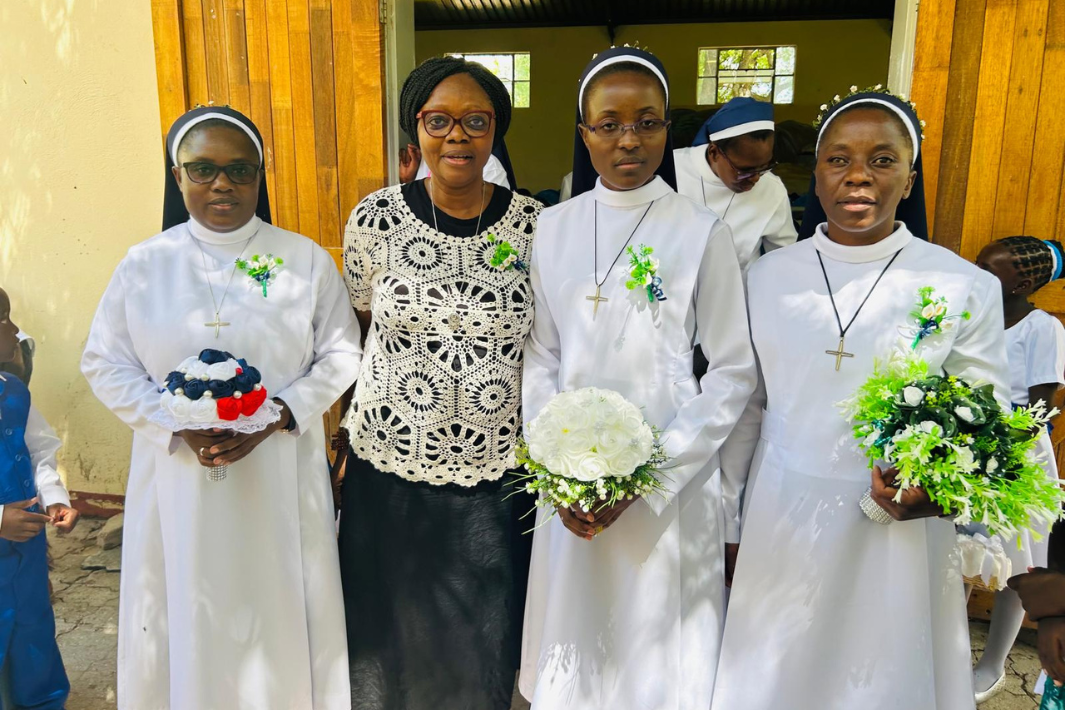By Paschal Norbert
WINDHOEK, JANUARY 17, 2024 (CISA) -The final document of the Synod on Synodality calls for ongoing formation for all baptized Catholics, emphasizing the importance of equipping individuals, particularly those who work with vulnerable adults, with the knowledge and skills to embody Christ’s mission in the world.
In the vast and captivating landscapes of Namibia, a land renowned for its breathtaking beauty and rich cultural heritage, a vibrant Catholic community thrives. In this southern African nation, where over 80% of the population identifies as Christian, the Catholic Church plays a crucial role in shaping both the spiritual and social lives of its people.
As of 2024, Namibia had a Catholic population of 693,000, representing about 22.8% of the total population. This mission is carried forward by about 105 priests and 452 nuns serving across 99 parishes, within an ecclesiastical structure that includes two dioceses, one of which is an archdiocese, alongside an Apostolic Vicariate.
Amid this dynamic context, Sr Anne Arabome SSS, a seasoned theologian and educator and a member of the Sisters of Social Service of Los Angeles, has made history by establishing Africa’s first-ever theological and spiritual formation center to empower and support religious women—The Sophia Institute for Theological Studies and Spiritual Formation.
In the vast lands of Namibia, Sophia Institute for Theological Studies and Spiritual Formation emerges as a beacon of hope. Established to empower and nurture women religious in Africa, the institute is a unique initiative dedicated to fostering spiritual growth, theological depth, and pastoral competence. By addressing the call for formation with a specific focus on women religious, Sophia Institute seeks to strengthen the Church’s mission through the invaluable contributions of those who serve at the grassroots and the forefront of communities across the continent. Addressing a challenge shared by many African religious communities: the need for deeper and ongoing spiritual formation and transformative leadership within the Church.
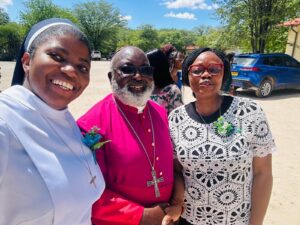
While some parts of Southern Africa face a decline in vocations to religious life, others witness growth that brings its own demands for leadership and formation. This is where the Sophia Institute emerges as a beacon of hope. Established to meet these pressing needs, the institute is a groundbreaking initiative dedicated to empowering and nurturing women religious across Africa.
At the heart of this transformative mission is Sr Anne, whose journey to Namibia reflects her unwavering commitment to God’s call and her vision for a thriving, spiritually enriched Church.
What makes the Sophia Institute resonate so deeply with many religious women considering joining is the wealth of experience and expertise Sr Arabome brings . As a religious sister and seasoned scholar, her background in Ignatian spirituality and theology forms a cornerstone of the institute’s appeal.
Sr Arabome spent eight years as Associate Director of the Faber Center for Ignatian Spirituality at Marquette University in Milwaukee, Wisconsin, where she honed her skills in spiritual formation and guidance. In addition, she serves as a faculty member at Hekima University College in Nairobi, teaching anthropology, spirituality, and religious life as part of the Sister-Scholars program.
Her academic credentials include a Ph.D. in Systematic Theology from the University of Roehampton in the UK and a Doctorate in Ministry and Spirituality from Catholic Theological Union in Chicago. These qualifications, combined with her extensive lived experience, make her a compelling leader.
Answering the Call: Sr Anne Arabome SSS
In an interview with CISA, Sr Anne shared her journey with characteristic grace and conviction, explaining the decision that marked a new chapter in her life, driven by the desire to address the spiritual and pastoral needs of religious women in Africa through the establishment of Sophia Institute.
“I am originally from Nigeria, but for the past two and a half decades, I’ve been a member of the Sisters of Social Service in Los Angeles, California,” she begins, her calm voice carrying the depth of years dedicated to service and contemplation.
“Until February of last year, I was working at Marquette University. However, I recently felt called to respond to God’s mission in Africa, and I relocated,” she says.
Today, she serves as one of the three co-directors of the Sophia Institute, based in Namibia. Her work is deeply influenced by the teachings of Pope Francis and the outcomes of the Synod on Synodality, which emphasize inclusion, collaboration, and renewal within the Church.
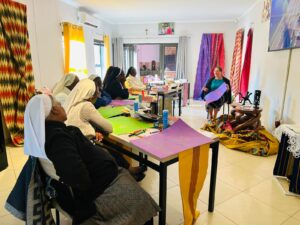
For Sr Anne , the Synod’s call for a “change of mentality and a renewed approach to both formation contexts and processes” resonates profoundly with her experiences in Africa and beyond.
Alongside Sr Arabome, Sophia Institute is led by two accomplished directors: Prof Tina Beattie, who until August 2020, was the Professor of Catholic Studies at the University of Roehampton in London, and Dr Nontando Hadebe, a laywoman theologian and the current chair of the South African chapter of the Circle of Concerned African Women Theologians.
The Mission of Sophia Institute
The Sophia Institute was born out of a simple but profound vision: to form women and men who are alive in the Spirit and thriving in ministry. As Sr Arabome explains, “It’s about people – how to support their dreams for spiritual growth, empower them to succeed, and motivate them to flourish in their religious life.”
This vision is not just about spiritual formation; it’s about equipping individuals to lead, inspire, and transform their communities. The Institute focuses on forming leaders who can navigate the complexities of contemporary life while remaining rooted in their faith.
According to Sr Anne , “What we’re doing at Sophia is precisely what the Synod recommended: a change of mentality and a renewed approach to both formation contexts and processes.”
Sr Arabome observes that Africa is experiencing exponential growth in vocations to religious life, a promising sign for the Church but one that comes with significant challenges.
Reflecting on her time in Malawi, she recalls a poignant conversation that underscored the urgency of addressing these challenges: “I remember sitting with the Association of Consecrated Women in Eastern and Central Africa (ACWECA) who were lamenting the lack of adequate formation programs. They said, ‘We’re celebrating 50 years of existence, and yet we still don’t have proper formation for formators. What are we waiting for?’”
This concern is echoed across the continent. While many institutions offer formation programs, few are equipped to provide the robust, contextualized training needed to form competent formators and spiritual directors. The Synod’s final document emphasizes this, stating: “We, therefore, need to invest in the formation of formators who are capable of demonstrating with their lives what they transmit with their words.”
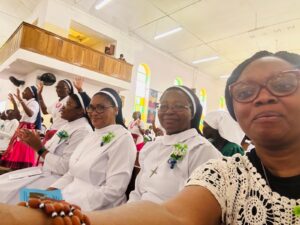
According to Sr Arabome , Sophia Institute responds to this urgent need by offering programs tailored to the African context. The institute’s courses cover leadership formation, theological education, and spiritual development, all aimed at empowering women religious and fostering a collaborative approach to ministry.
Through this initiative, she seeks to equip these women with a strong foundation in theology, Scripture, spirituality, and leadership skills, which are essential tools for their roles in serving marginalized communities and promoting social justice. By addressing these critical areas, Sophia Institute hopes to strengthen the Church’s impact in Africa, ensuring that religious women are prepared to meet the needs of their communities with compassion, knowledge, and effective leadership.
Synod’s Influence and Space for Renewal
For Sr Anne Arabome, this vision is not just theoretical. It’s rooted in her lived experience.
“From the religious superiors in Namibia to my online theology students who confide in me, to the sisters who share their stories, the need for transformative formation is clear,” she says.
She also explains that the Synod on Synodality has provided a framework for much of the work at Sophia Institute. Its emphasis on shared formation and mutual collaboration aligns perfectly with the institute’s mission.
“Formation must engage all dimensions of the human person,” she notes, quoting the Synod’s final document, “It must promote openness, encounter, and co-responsibility.”
Sophia Institute offers more than programs; it provides a sanctuary for renewal. “We offer an oasis of serenity and peace to all religious women who seek to connect with their spiritual depth,” Sr Arabome explains. The institute’s holistic approach integrates intellectual, emotional, and spiritual growth, creating a space where individuals can discern God’s will and deepen their commitment to their mission.
This commitment to renewal is particularly important in a Church that, as Sr Anne observes, is grappling with complex societal issues. From debates on inclusivity to controversies surrounding Church teachings, the need for compassionate and visionary leaders has never been greater.
“We need to reimagine the Church as a place of mercy, compassion, and love,” she says.
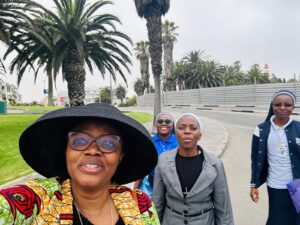
The Role of Women in the Church
Central to the Sophia Institute’s mission is the empowerment of women. “Women have so much to offer,” Sr Arabome asserts. “Yet, in the 21st century, we are still struggling to fully include women in decision-making roles within the Church.”
The Synod’s final document acknowledges this challenge, calling for greater recognition of women’s charisms and contributions. Sophia Institute is answering this call by providing women with the tools they need to lead and inspire.
“When women are empowered,” Sr Arabome says, “everyone benefits, the Church becomes richer, more inclusive, and more reflective of the image of God.”
As the Sophia Institute continues to grow, its impact is already being felt across Africa. Sr Arabome envisions a future where women religious are not only well-formed but also continue to lead transformative change in their communities.
“In the next decade, I hope to see many of the sisters we are working with assuming leadership roles and contributing to the Church in meaningful ways,” she says.
For Sr Anne, the work of Sophia Institute is just beginning but it is also a testament to the power of faith, collaboration, and vision. It’s a response to the Synod’s call for renewal and a reminder that, even in the face of challenges, hope is alive. As our conversation draws to a close, she extends an invitation: “If you’re interested in deepening your faith, exploring theology, or growing as a leader, Sophia Institute is the place for you. Together, we can build a Church that is alive in the Spirit and thriving in mission.”
